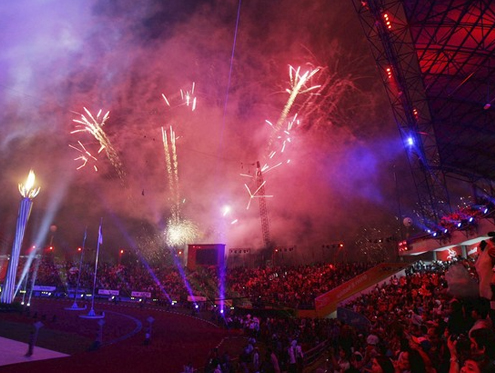With less than 100 days to go, the countdown is on until the opening ceremony of the 27th Southeast Asian Games in Burma on 11 December. Competitors and officials alike are busy preparing for an event will undoubtedly pose a logistical challenge for the capital city, Naypyidaw.
The fact that the Southeast Asian Games Federation Council decided to award Burma with the hosting of one of the most popular and important sports competitions in the region indicates that the new government has won acceptance and trust among its counterparts.
From a sports point of view at least, it appears that Burmese officials are self-confident. The last time they hosted the games in 1969, Burma won 149 medals. Speaking earlier this year, Minister of Sports Tint San was quoted saying: “Although we target more gold medals at the 27th SEA Games, we will compete in the games with dignity.”
A total of 33 sports will be contested with 11 nations participating. However, even before the stadiums had been fully constructed, Burmese games officials were criticised for manipulating the sports in a way that favours domestic athletes. Burma opted to exclude popular sports such as tennis, badminton, gymnastics and beach volleyball—the latter, reported to be for reasons that the sportswear was “not suitable for Myanmar culture”.
Meanwhile, substitutes were found in traditional but rare disciplines such as vovinam (a martial arts form, originally Vietnamese) and chinlone (an acrobatic Burmese rattan ball game). This led to letters of complaint from Malaysia, the Philippines, Singapore and Thailand. Paired with the sports minister’s words about targeting as many medals as possible, it’s clear Burma got off to a bad start in the game of public relations.
The SEA Games were held for the first time in Thailand in 1959, promoted as a summit to enhance understanding and cooperation between the participating countries. The theme for the SEA Games this year is “Green, Clean and Friendship”, a motto that sounds modern and environmental. But it is a difficult task to prepare a new city such as Naypyidaw for such a massive influx of people in a sustainable way, with infrastructure and tourism facilities remaining below par at best.
“I think it’s very difficult to have responsible tourism when the aim is to have three million tourists by 2015,” said Andrea Valentin, founder of Tourism Transparency, speaking to DVB
A wide range of sporting facilities—among them the main arena Wunna Theikdi Stadium, which seats 30,000—have been built over the past year. The majority of the competitions, plus of course the opening and closing ceremonies, will be held in Naypyidaw, but events will also take place in Mandalay, Rangoon and, for sailing, Ngwe Saung Beach.
According to data in 2012, Burma has more than 28,000 hotel rooms available in 787 hotels across the country. Those numbers are rapidly expanding, but even so, it is not enough to meet demand and hotel prices have risen steeply.
The minister of tourism has warned that many visitors may be put off staying in the capital, and has urged that regulations be imposed to put ceilings on hotel prices.
[related]
Another issue that has not gone unnoticed is whether Burmese sports fans are mature enough to host an international event. During a soccer match a month ago and also at a World Cup qualifier match in 2011, wild brawls broke out and many spectators began throwing bottles. Security arrangements were proved woefully inadequate. Concerns have been raised about sports fans reacting aggressively to disappointment.
To meet these challenges, Burma’s Vice-president Nyan Tun requested collaboration between the government and the various sports federations. To meet the comfort of visitors, athletes, officials and media, ATMs are due to be installed close to the venues, and several new roads and airport facilities should open before the games begin.
In the lead-up to the opening ceremony, pre-games and qualification events are being held in Naypyidaw. Last Wednesday, Vice-president Nyan Tun presided over an opening ceremony for qualifying rounds of karate. He presented the competitors with gifts and everything went off without a hitch. Of course it’s still early days, but if the SEA Games of 2013 go well, it will be a prestigious boost for the country.



